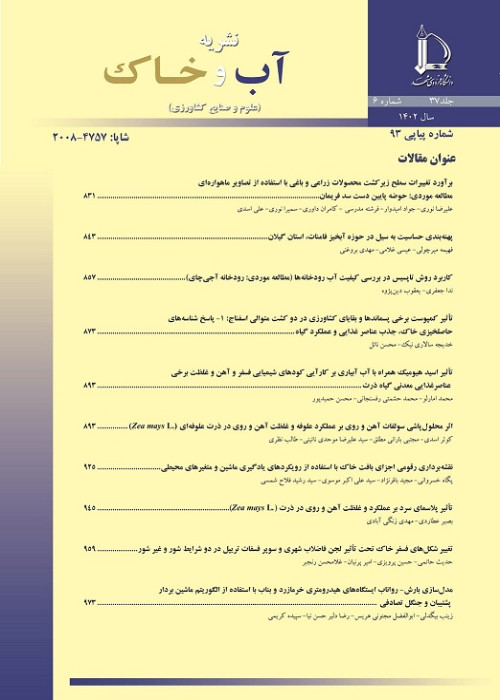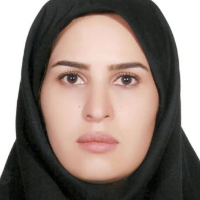Influence of PGPR Bacteria and Arbuscular Mycorrhizal Fungi on Growth and some Physiological Parameters of Onopordon acanthium in a Cd-Contaminated Soil
Author(s):
Abstract:
Introduction
Heavy metals (HMs) are serious threat for environment due to their dangerous effects. These metals as contaminants that can be accumulated in soil and after absorption by plants, finally will be found in food chains. Cadmium (Cd) is one of the dangerous HMs that threats the health of plants, living organisms and human. Physicochemical remediation methods may cause large changes in different characteristics of soils . Recently environmental-friendly strategies including phytoremediation have been emphasized by researchers. Phytoremediation that refers to the use of plants and their assistance with microorganisms for remediation of contaminated soils is an effective and low cost method for reclamation of heavy metals polluted soils. The most important limitation of phytoremediation is low availability of heavy metals and sensitivity of plants to contamination. There are evidences that soil microbes can help to overcome these limitations through several ways. Plant growth promoting rhizobacteria (PGPR) and arbuscular mycorrhizal fungi (AMF) are known to enhance plant growth and survival in heavy metal contaminated soils through different mechanisms including producing promoting metabolites, auxin, siderophore and antibiotics. In this study the role of some strains of PGPR (a mixture of Pseudomonas species including P. putida, P. fluorescens, and P. aeruginosa) and AMF (a mixture of Glomus species including G. intraradices, G. mosseae and G. fasciculatum), on uptake and accumulation of Cd, Fe, Zn and Cu as well as some physiological properties of Onopordon (Onopordon acanthium L) were evaluated.Materials And Methods
This study was carried out under greenhouse condition as a factorial experiment based on a randomized complete block design with two factors including Cd concentration (four levels) and microbial treatment (three levels) in three replications. Consequently, a soil was selected and spiked uniformly with different concentrations of Cd (0, 10, 30 and 100 mg Cd kg-1 soil) at greenhouse of agricultural college in Urmia University. The contaminated soils were then sterilized and subsequently inoculated with arbuscular mycorrhizal fungi (a mixture of Glomose species including G. intraradices, G. mosseae and G. fasciculatum) and plant growth promoting rhizobacteria (a mixture of Pseudomonas species includeing P. putida, P. fluorescens, and P. aeruginosa). The seeds of Onopordon plants were grown in 2.5 kilogram pots under greenhouse condition. At the end of growing season the shoot dry weight, Cd, Fe, Zn and Cu concentration and element contents and some of physiological parameters of plant as well as microbial properties were analyzed. Furthermore, the effect of soil Pb level on population, activity and efficiency of the inoculated microbes was studied.Results And Discussion
Significant difference was observed for plants dry weights. At different Cd levels, the yield of inoculated plants was higher than that of control plants. Furthermore, at elevated Cd concentration, plant height, biomass, relative yield, chlorophyll a, b, carotenoids, relative water content (RWC) decreased significantly (P Conclusion
It is concluded that plant growth promoting rhizobacteria and arbuscular mycorrhizal fungi inoculation could be sustained and promoted plant growth in phytoremediation processes. Therefore, under Cd contamination it can be use PGPR and AMF as growth promoters and finally enhance phytoremediation efficiency.Keywords:
Language:
Persian
Published:
Journal of water and soil, Volume:30 Issue: 2, 2016
Pages:
542 to 554
magiran.com/p1568295
دانلود و مطالعه متن این مقاله با یکی از روشهای زیر امکان پذیر است:
اشتراک شخصی
با عضویت و پرداخت آنلاین حق اشتراک یکساله به مبلغ 1,390,000ريال میتوانید 70 عنوان مطلب دانلود کنید!
اشتراک سازمانی
به کتابخانه دانشگاه یا محل کار خود پیشنهاد کنید تا اشتراک سازمانی این پایگاه را برای دسترسی نامحدود همه کاربران به متن مطالب تهیه نمایند!
توجه!
- حق عضویت دریافتی صرف حمایت از نشریات عضو و نگهداری، تکمیل و توسعه مگیران میشود.
- پرداخت حق اشتراک و دانلود مقالات اجازه بازنشر آن در سایر رسانههای چاپی و دیجیتال را به کاربر نمیدهد.
In order to view content subscription is required
Personal subscription
Subscribe magiran.com for 70 € euros via PayPal and download 70 articles during a year.
Organization subscription
Please contact us to subscribe your university or library for unlimited access!




